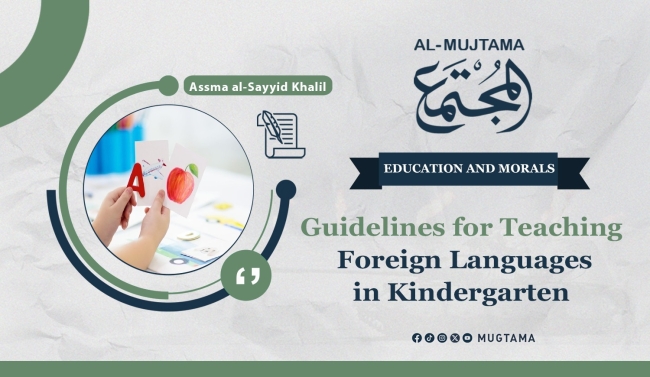Guidelines for Teaching Foreign Languages in Kindergarten
Kindergarten is an organized educational institution that serves as a bridge between home and school. It aims to develop children's skills and knowledge from the age of one to six years (depending on the country’s system) through educational and social activities during one of the most critical stages for shaping a child's personality and building their abilities.
In kindergarten, children become accustomed to collaborative play, gain control over their movements, and learn to recognize the objects around them in an interactive environment. This fosters greater freedom and receptivity to learning.
Learning at this stage—particularly learning the mother tongue—lays the foundation for developing the child’s intellectual and cognitive abilities, enhancing their thinking, focus, and creativity, and building their emotional resilience. However, debates persist about the duality of teaching languages to children at this stage: Is it beneficial or harmful, especially in today's competitive cultural environment and unprecedented technological revolution?
Educational Benefits
There is no doubt about the numerous educational benefits of kindergarten. With a proper and systematic approach, preschool children can develop linguistic skills by mastering the basics of language, reading, forming sentences, coloring, counting, understanding numbers, and performing basic arithmetic operations like addition and subtraction. Early learning also reduces difficulties in reading, speaking, and writing, which have become common challenges today. This forms a cornerstone for their educational journey, extending into youth and possibly beyond.
Studies have shown that the skills learned in this stage enable children to attain continuous, high-quality education and adopt positive attitudes toward learning. They also have better job opportunities than others.
Many studies have documented that children who attended early education programs and had been in kindergarten demonstrated significantly higher IQ levels than their peers. They also performed better in reading, writing, and arithmetic tests and were more confident in their relationships with teachers and peers within social and interactive frameworks.
The Importance of Foreign Languages
The importance of learning foreign languages during this early stage of a child’s life cannot be denied. It enhances cognitive, cultural, and practical life skills, improves decision-making abilities, achieves academic success, and fosters acceptance and respect for others’ cultures and norms. Learning foreign languages also represents an investment in the child's future, expanding their horizons.
In today's interconnected world, learning one or more languages besides the mother tongue has become essential. It is easier to achieve at this age than at any other since, as the saying goes, " Early Start, Grow Smart." It benefits the child’s mental development and ability to form cultural connections.
Bilingual individuals today can easily integrate into different cultures and communities, explore new horizons, understand the feelings, behaviors, principles, and orientations of other nations, and communicate and engage effectively with them. This ability allows for the transfer of cultural achievements and keeping pace with advanced nations.
Potential Risks
Despite the advantages mentioned earlier about learning foreign languages in childhood, experts in child development have detailed several risks. Many favor teaching a second or third language after mastering the mother tongue. This, they argue, serves as a solid foundation for quickly acquiring additional languages and recommend starting this process during adolescence. They criticize those who impose foreign languages on their young children for social prestige without considering the consequences of combining the mother tongue with a foreign language. These consequences include:
- Confusing and overwhelming the child's mind and memory.
- Neglecting the original language, leading to linguistic confusion and a decline in Arabic language skills due to mixed vocabulary and overlapping grammar.
- More importantly, such linguistic diversity may obscure identity, prioritizing the language and culture of others over our history, culture, and language.
Guidelines
Learning foreign languages in kindergarten is not inherently harmful if these risks are avoided. The matter requires setting clear guidelines to ensure our children grow up with balanced speech, sound identity, and proper linguistic development. These guidelines include:
- Ensuring that learning these languages does not conflict with the principles of our religion, history, and traditions.
- Monitoring the child closely at this stage and noting any risks or symptoms previously mentioned.
- Reevaluating teaching methods and curricula for these languages, as necessary.
- Prioritizing Arabic—the language of the Qur’an—above all else. This has become easier for those whom Allah has facilitated access to it.
-------------------------------------------------------------


